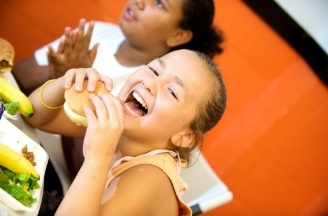Fighting Child Hunger with the Summer Food Service Program
 It was last November, just a few months after I started as the Program Manager here at the Food Bank, when Gail Lombardi from the Department of Education reached out to the Food Bank looking for help in starting a Summer Lunch program in Bangor. I left my meeting with her with a great big book about what it means to be a Sponsor for USDA’s Summer Food Service Program and a head swimming with questions about how we could possibly make this work.
It was last November, just a few months after I started as the Program Manager here at the Food Bank, when Gail Lombardi from the Department of Education reached out to the Food Bank looking for help in starting a Summer Lunch program in Bangor. I left my meeting with her with a great big book about what it means to be a Sponsor for USDA’s Summer Food Service Program and a head swimming with questions about how we could possibly make this work.
At the time, the Food Bank wasn’t sure exactly how we were going to pull off operating a program we’d just learned about, in a city over 100 miles away from the person responsible for overseeing it. What we were sure of was that despite the availability of USDA funding for Summer Meal programs, only about 16% of the 80,000 Maine children who depend on free and reduced-price meals for proper nourishment during the school year receive meals during the summer. We also knew that the city of Bangor, one of Maine’s largest urban areas, had not had a single summer meal site in operation in more than two years. Most importantly, we were sure that we couldn’t let another year go by without Bangor children having access to this important safety net program.
And so it began.
With the help of Gail at the Department of Education, we began meeting with other nonprofits and government agencies in the Bangor area and across the state to figure out how we could all work together to make this program happen for the Summer of 2012. We formed a planning committee and after just a few meetings we had established where the children most in need of these meals spent their afternoons in the summer, and which organizations could make sure that staff or volunteers were available at those locations to hand out food and take care of the necessary paperwork.
From there we needed to find an organization that could take on preparing around 270 meals per day, so we connected with BAFS, Inc., a food service management company that helps prepare the meals for Meals on Wheels. With lots of help from the experts at the Department of Education, we put together a contract for meal preparation and we were well on our way to having our program planned. The group has continued to meet to brainstorm outreach efforts, enrichment activities, and volunteer recruitment for the three sites where meals will be served.
While I won’t claim that being a Summer Food Service Program Sponsor has been easy, it hasn’t been nearly as difficult as we originally feared. For every new step we didn’t know quite how to take, experienced sponsors like Kids Katering in Portland and Maine Hunger Initiative were there to walk us through it. For every page of that big book of rules and regulations that didn’t quite make sense, Nanci or Gail from the Department of Education were happy to explain.
Childhood hunger doesn’t have to exist. There is funding available for those willing to make sure kids get meals daily during the summer, and a wealth of knowledge and resources from existing program sponsors throughout the state. There are sample press releases, template flyers, and checklists on how to give trainings. There are outreach tool kits from Share Our Strength and how-to guides from Feeding America.
In fact, there’s really only one thing that there isn’t enough of, and that’s meal site sponsors. I encourage you to find out if there are Summer Food Service Program sites in your community this summer. If there are, I’m willing to bet they’d love your help, whether it be handing out flyers or serving sandwiches.
If there isn’t a meal site in your town, I encourage you to start talking to your neighbors, friends, and family about starting one. Contact the local hunger ending or child services nonprofits and your local school system. What we’ve learned in Bangor this year is that once the right partners are at the table, and they have learned what they can do to feed children, there is nothing that can stop you from operating a successful program for the kids in your community.